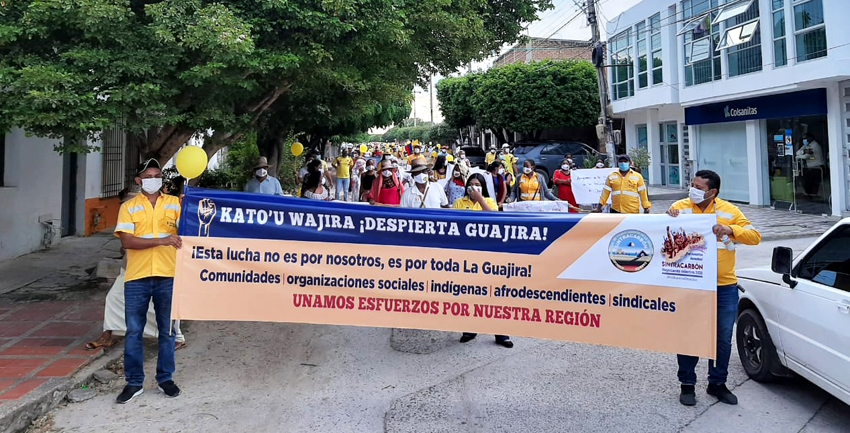
OVER 4,000 miners, members of the Sintracarbón union, have entered the third month of a bitter strike at the Cerrejón coal mine in Colombia.
The action began on August 31 after negotiations with management collapsed.
The Cerrejón mine is jointly owned by three multi-national mining companies, Anglo American, BHP and Glencore.
A union statement issued last week said: ‘In February 2020, Sintracarbón, in good faith, withdrew its list of demands and suspended collective bargaining negotiations due to the emergence of the Covid-19 pandemic.
‘But since the current round of collective bargaining negotiations in July, the company has not responded to the union’s bargaining proposals and has instead demanded concessions in acquired rights and benefits.
‘On the second day of negotiations, Cerrejón unilaterally announced a radical shift change roster, without consulting the union and in violation of Colombian law.
‘The new shift roster, which workers call the “death shift”, will lead to the loss of 2,500 direct and indirect jobs, will require workers to work an additional 72 days a year for the same wage, will cause turmoil in workers’ family lives – particularly those with family responsibilities – and will lead to an increase in fatigue and thus an increase in accidents.’
About 99% of Sintracarbon union members agreed in August to down tools to demand a 6% salary hike in addition to health, education and housing benefits.
However, Cerrejón has boycotted the government labour ministry’s facilitation to end the strike.
Through a statement, the Cerrejón company notified the more than six thousand workers that, starting next month and introduced ‘gradually’, all existing shifts will be unified into just one of seven working days, for three days off.
This pace of work would lead to an increase in the physical and psychological exhaustion of workers and, consequently, an increase in accidents that could lead to death warns the union.
The decision was made unilaterally and without consulting the union which has firmly rejected it saying:
‘Currently, due to long working hours, long travel times, the illnesses generated by this work and the harshness of the work carried out, the workers at Cerrejón, thanks to union action, have working hours that allow long periods of time-breaks.
‘A week for a worker in Cerrejón is as follows: Monday, he works from 6.00am to 6.00pm, 12 continuous hours a day (only half for lunch); Tuesday, he works 12 continuous hours at night from 6.00pm to 6.00am; Wednesday, rest; Thursday, he works 12 continuous hours during the day; and Friday, 12 continuous hours at night; Saturday, Sunday and Monday, rest; and on Tuesday, the cycle begins again.
‘This means that you work 15 days a month, at the rate of 12 hours a day, a total of 180 hours a month on average.’
Most Colombians with work shifts work an average of 170 hours per month. But with the new shifts, workers would go from working 15 to 21 days and the mine would go from four to three work shifts, leaving at least 25% of the current workforce unemployed.
With the current shifts, Cerrejón has more than 700 pathologies associated with musculoskeletal, respiratory, cardiovascular and ear diseases, among others – a very high figure, but lower than that seen in other companies in the same sector in Colombia.
Companies such as Prodeco and Drummond, which have been in operation for fewer years, outnumber Cerrejón, which has been operating for 35 years, in accumulated number of work accidents and occupational diseases.
And this has been thanks to the action of the union that has taken care of the health, life and working hours of the workers in Cerrejón.
Now, the company aims to end a lifestyle and pace of work that workers have struggled to sustain for more than three decades. The new shift threatens their health and life, with great family and social implications.’
A joint union statement, with the international IndustrALL union reaffirmed financial support for the strike saying: ‘The purpose of this decision is to continue resisting firmly and supporting our just and glorious strike for life, family and job stability, which we undertook since August 31 and which is approaching 60 days, with no forecast of when will it end.
‘Sintracarbón understands that each and every member is making a great sacrifice in this fight, with the firm conviction that we are taking care of what we have achieved and thinking about a future without deterioration in our working and living conditions and for that, we acknowledge and appreciate immensely that sacrifice.
‘We also take the opportunity to thank once again the national and international solidarity, on the part of several sister organisations and sections of Sintracarbón, which today we can crystallise in this solidarity aid to the strikers.’
The company has denied there will be mass job cuts and loss of benefits claiming the prospective shift change is key to keeping Cerrejon competitive amid its lowest export figures in 18 years and prices equivalent to 2004 levels.
Cerrejon also insists the shift change – a move from a previous schedule where workers had alternating day and night shifts for four out of every eight days to a 21-day schedule which includes two seven-day work periods – is legal and not a part of its contract discussions with the Sintracarbon union.
But the union says more consecutive shifts will create health and safety risks. Sintracarbon also opposes proposed eliminations of some educational benefits and bonus reductions.
‘Cerrejon’s intentions are contrary to the workers’ interests,’ union president Igor Diaz said.
‘They haven’t responded to workers’ requests but have been trying to cut benefits, basing their argument on the sustainability of the company.
‘The “death shift” would allow the company to cut 1,250 direct jobs,’ Diaz pointed out.
‘Its implementation would require changes to things already in the union contract and so it must be part of negotiations,’ he said.